European Business Law: Corporate Law and Trade Issues Report
VerifiedAdded on 2022/10/12
|17
|4449
|487
Report
AI Summary
This report provides a comprehensive analysis of a case study centered on European Business Law. The scenario involves a business owner, Francesca, facing challenges related to taxation and trade when expanding her chocolate business within the European Union. The report delves into issues concerning VAT (Value Added Tax) discrepancies between Bulgaria and other EU member states, specifically addressing the application of different VAT rates on traditionally produced versus workshop-produced chocolates. It examines the implications of the Treaty on the Functioning of the European Union (TFEU), particularly Articles 28, 30, and 110, concerning the free movement of goods and the prohibition of discriminatory taxation. The analysis also considers Article 82 of the EC treaty, which addresses the abuse of dominant market positions. Additionally, the report addresses a separate issue where Francesca's chocolate shipment is impounded by Croatian customs due to concerns over animal gelatine, and discusses the role of the European Food Safety Authority (EFSA) and the principle of "Cassis de Dijon" in relation to public health and consumer protection. The report concludes by evaluating the actions of the Bulgarian and Croatian customs departments in light of EU law and offers insights into resolving the legal challenges faced by Francesca.
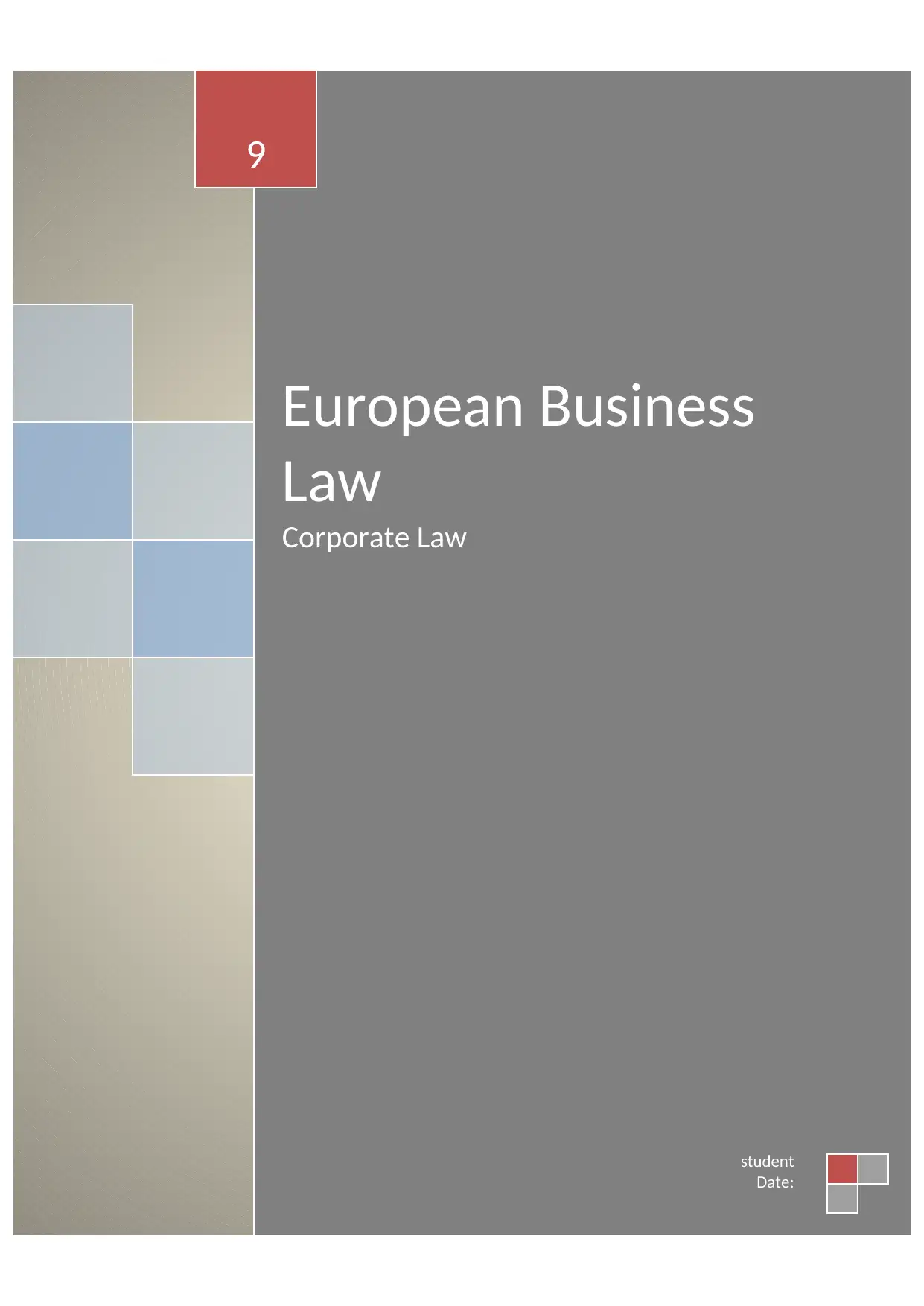
European Business
Law
Corporate Law
9
student
Date:
Law
Corporate Law
9
student
Date:
Paraphrase This Document
Need a fresh take? Get an instant paraphrase of this document with our AI Paraphraser
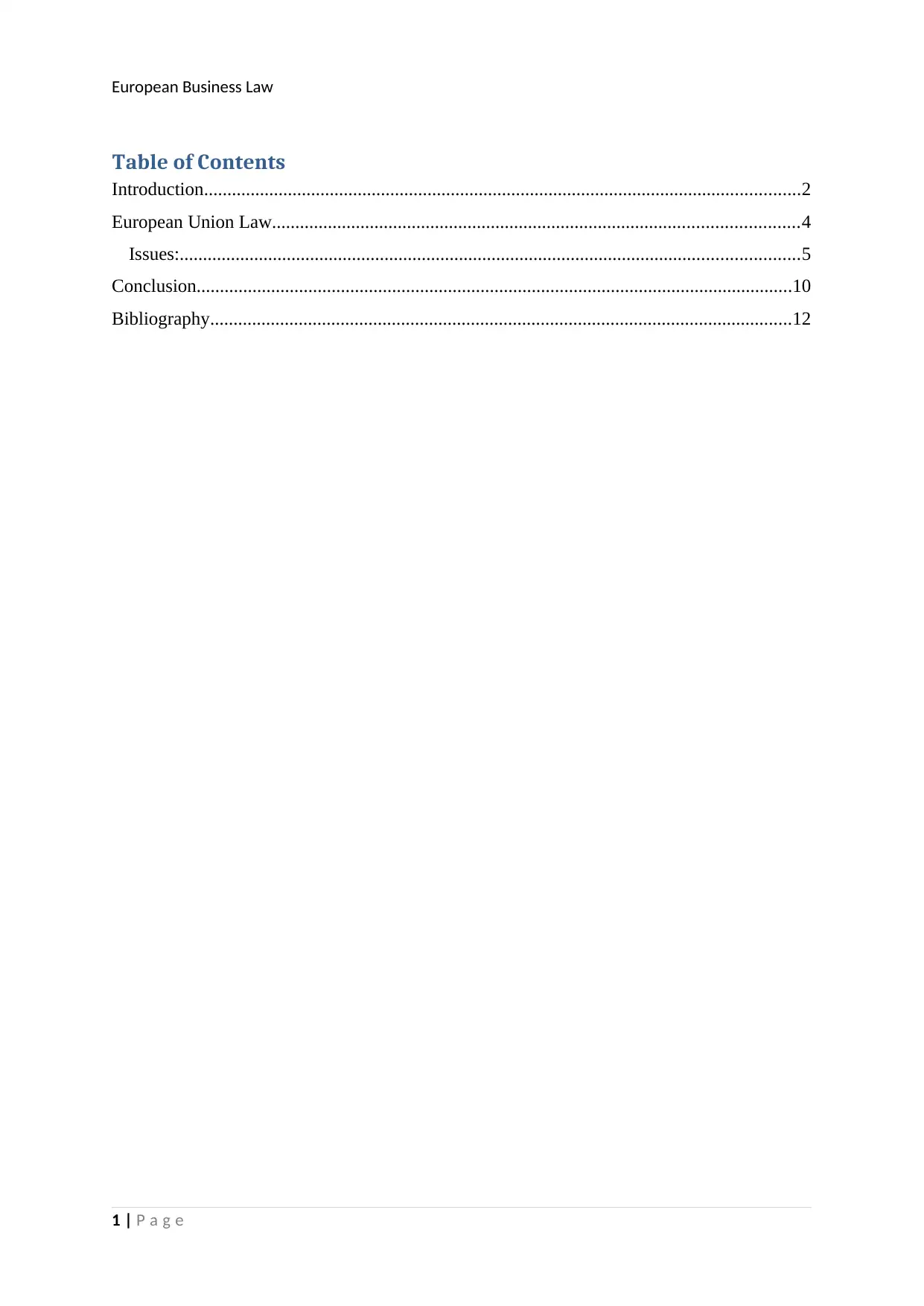
European Business Law
Table of Contents
Introduction................................................................................................................................2
European Union Law.................................................................................................................4
Issues:.....................................................................................................................................5
Conclusion................................................................................................................................10
Bibliography.............................................................................................................................12
1 | P a g e
Table of Contents
Introduction................................................................................................................................2
European Union Law.................................................................................................................4
Issues:.....................................................................................................................................5
Conclusion................................................................................................................................10
Bibliography.............................................................................................................................12
1 | P a g e
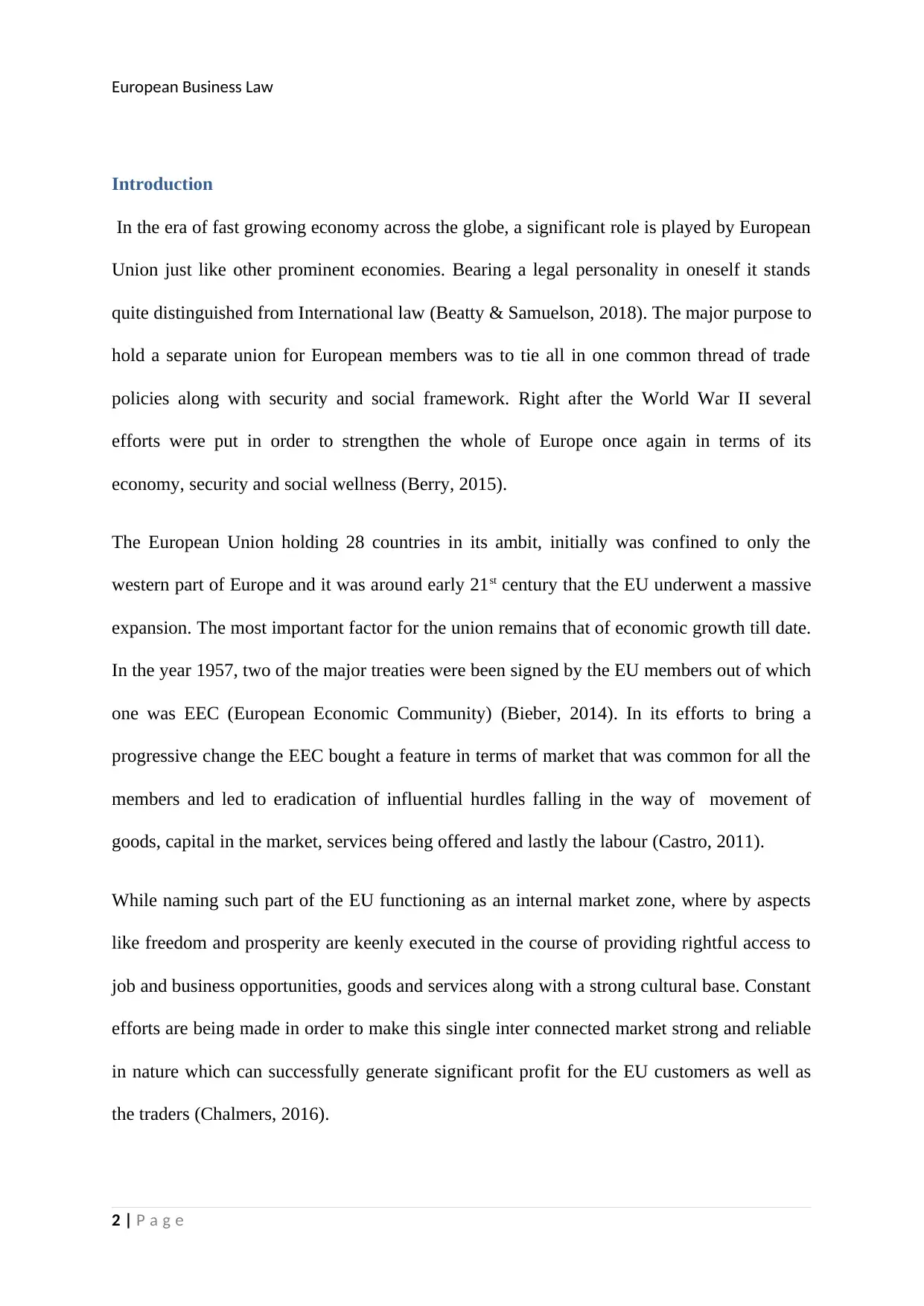
European Business Law
Introduction
In the era of fast growing economy across the globe, a significant role is played by European
Union just like other prominent economies. Bearing a legal personality in oneself it stands
quite distinguished from International law (Beatty & Samuelson, 2018). The major purpose to
hold a separate union for European members was to tie all in one common thread of trade
policies along with security and social framework. Right after the World War II several
efforts were put in order to strengthen the whole of Europe once again in terms of its
economy, security and social wellness (Berry, 2015).
The European Union holding 28 countries in its ambit, initially was confined to only the
western part of Europe and it was around early 21st century that the EU underwent a massive
expansion. The most important factor for the union remains that of economic growth till date.
In the year 1957, two of the major treaties were been signed by the EU members out of which
one was EEC (European Economic Community) (Bieber, 2014). In its efforts to bring a
progressive change the EEC bought a feature in terms of market that was common for all the
members and led to eradication of influential hurdles falling in the way of movement of
goods, capital in the market, services being offered and lastly the labour (Castro, 2011).
While naming such part of the EU functioning as an internal market zone, where by aspects
like freedom and prosperity are keenly executed in the course of providing rightful access to
job and business opportunities, goods and services along with a strong cultural base. Constant
efforts are being made in order to make this single inter connected market strong and reliable
in nature which can successfully generate significant profit for the EU customers as well as
the traders (Chalmers, 2016).
2 | P a g e
Introduction
In the era of fast growing economy across the globe, a significant role is played by European
Union just like other prominent economies. Bearing a legal personality in oneself it stands
quite distinguished from International law (Beatty & Samuelson, 2018). The major purpose to
hold a separate union for European members was to tie all in one common thread of trade
policies along with security and social framework. Right after the World War II several
efforts were put in order to strengthen the whole of Europe once again in terms of its
economy, security and social wellness (Berry, 2015).
The European Union holding 28 countries in its ambit, initially was confined to only the
western part of Europe and it was around early 21st century that the EU underwent a massive
expansion. The most important factor for the union remains that of economic growth till date.
In the year 1957, two of the major treaties were been signed by the EU members out of which
one was EEC (European Economic Community) (Bieber, 2014). In its efforts to bring a
progressive change the EEC bought a feature in terms of market that was common for all the
members and led to eradication of influential hurdles falling in the way of movement of
goods, capital in the market, services being offered and lastly the labour (Castro, 2011).
While naming such part of the EU functioning as an internal market zone, where by aspects
like freedom and prosperity are keenly executed in the course of providing rightful access to
job and business opportunities, goods and services along with a strong cultural base. Constant
efforts are being made in order to make this single inter connected market strong and reliable
in nature which can successfully generate significant profit for the EU customers as well as
the traders (Chalmers, 2016).
2 | P a g e
⊘ This is a preview!⊘
Do you want full access?
Subscribe today to unlock all pages.

Trusted by 1+ million students worldwide
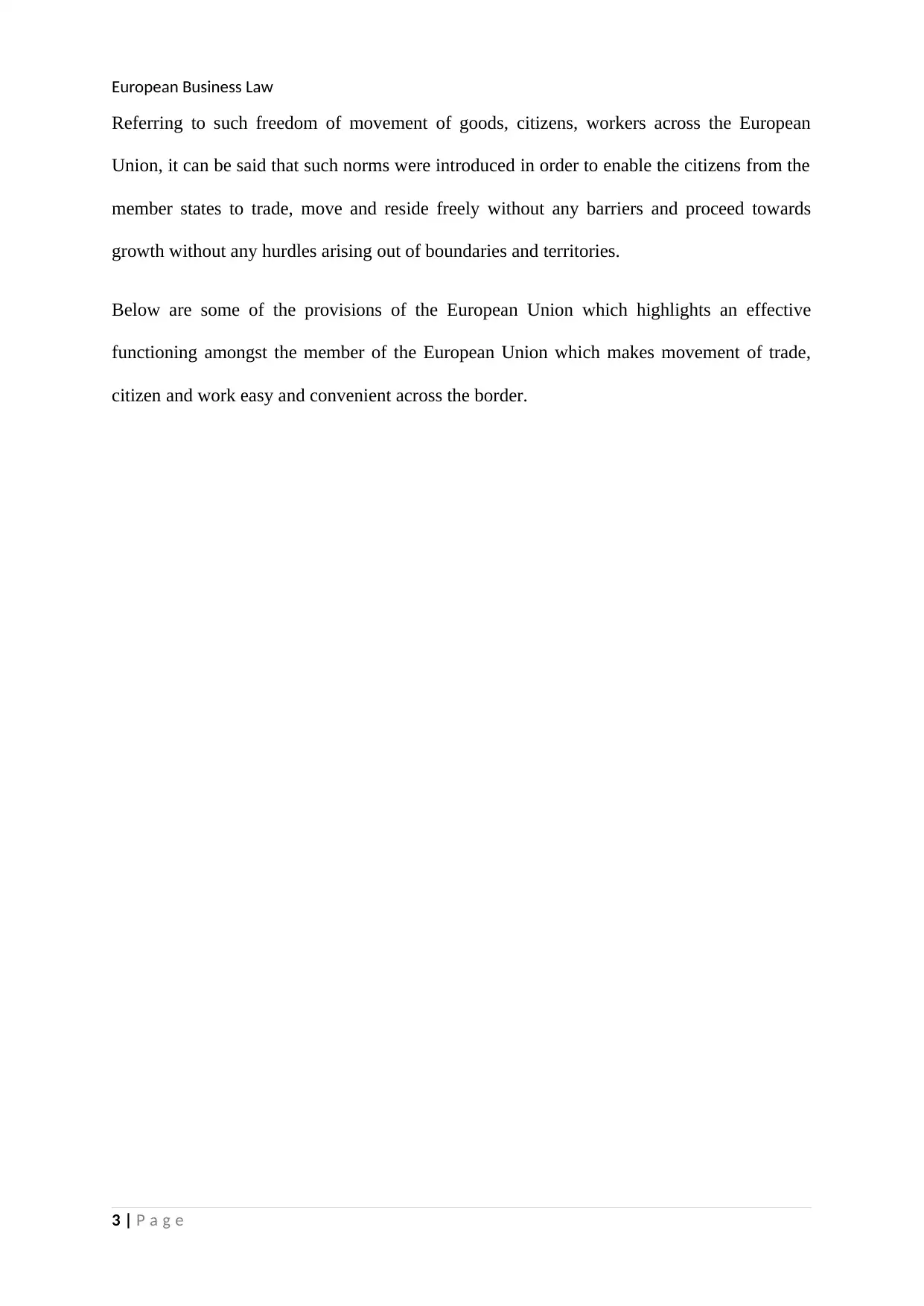
European Business Law
Referring to such freedom of movement of goods, citizens, workers across the European
Union, it can be said that such norms were introduced in order to enable the citizens from the
member states to trade, move and reside freely without any barriers and proceed towards
growth without any hurdles arising out of boundaries and territories.
Below are some of the provisions of the European Union which highlights an effective
functioning amongst the member of the European Union which makes movement of trade,
citizen and work easy and convenient across the border.
3 | P a g e
Referring to such freedom of movement of goods, citizens, workers across the European
Union, it can be said that such norms were introduced in order to enable the citizens from the
member states to trade, move and reside freely without any barriers and proceed towards
growth without any hurdles arising out of boundaries and territories.
Below are some of the provisions of the European Union which highlights an effective
functioning amongst the member of the European Union which makes movement of trade,
citizen and work easy and convenient across the border.
3 | P a g e
Paraphrase This Document
Need a fresh take? Get an instant paraphrase of this document with our AI Paraphraser
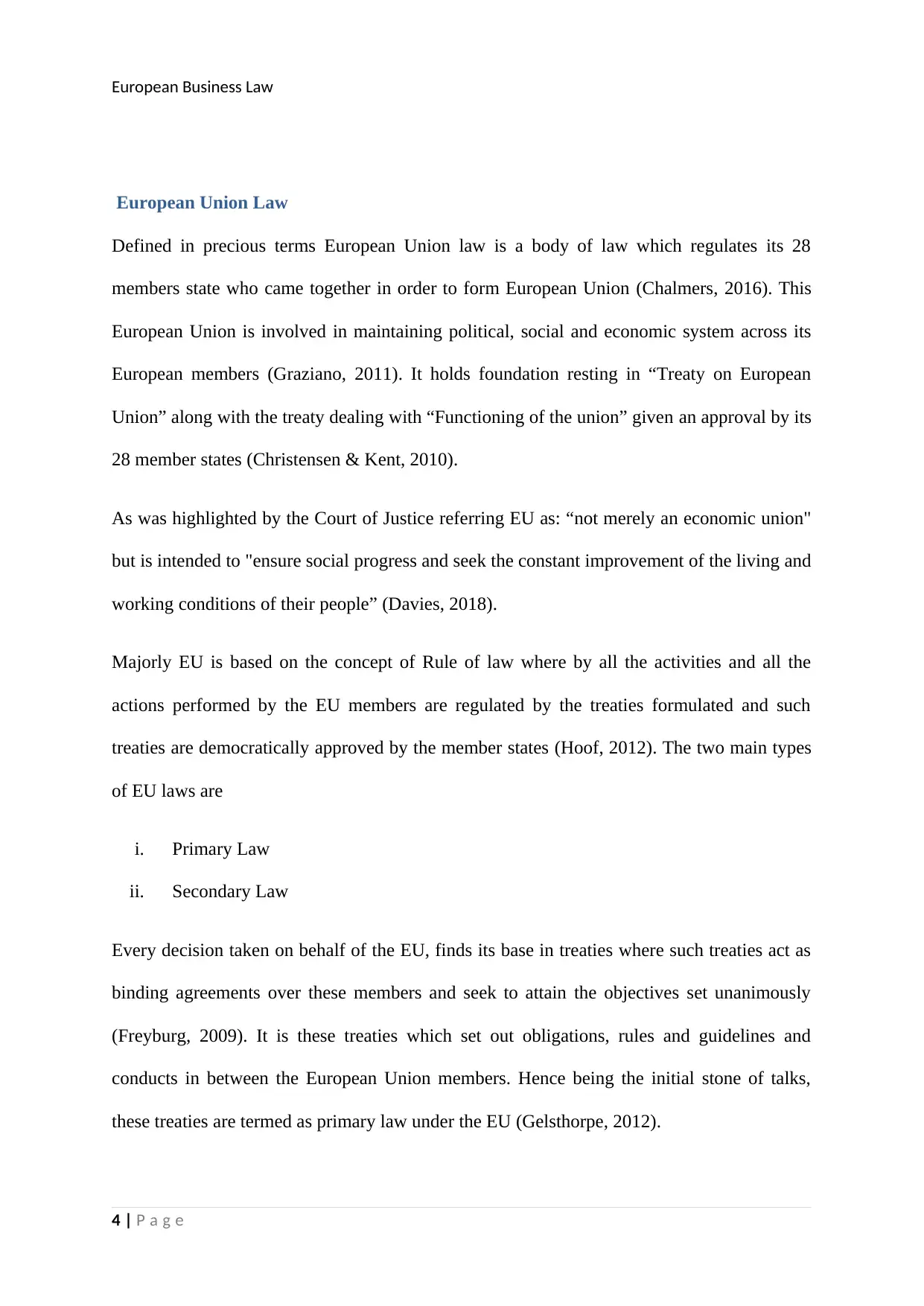
European Business Law
European Union Law
Defined in precious terms European Union law is a body of law which regulates its 28
members state who came together in order to form European Union (Chalmers, 2016). This
European Union is involved in maintaining political, social and economic system across its
European members (Graziano, 2011). It holds foundation resting in “Treaty on European
Union” along with the treaty dealing with “Functioning of the union” given an approval by its
28 member states (Christensen & Kent, 2010).
As was highlighted by the Court of Justice referring EU as: “not merely an economic union"
but is intended to "ensure social progress and seek the constant improvement of the living and
working conditions of their people” (Davies, 2018).
Majorly EU is based on the concept of Rule of law where by all the activities and all the
actions performed by the EU members are regulated by the treaties formulated and such
treaties are democratically approved by the member states (Hoof, 2012). The two main types
of EU laws are
i. Primary Law
ii. Secondary Law
Every decision taken on behalf of the EU, finds its base in treaties where such treaties act as
binding agreements over these members and seek to attain the objectives set unanimously
(Freyburg, 2009). It is these treaties which set out obligations, rules and guidelines and
conducts in between the European Union members. Hence being the initial stone of talks,
these treaties are termed as primary law under the EU (Gelsthorpe, 2012).
4 | P a g e
European Union Law
Defined in precious terms European Union law is a body of law which regulates its 28
members state who came together in order to form European Union (Chalmers, 2016). This
European Union is involved in maintaining political, social and economic system across its
European members (Graziano, 2011). It holds foundation resting in “Treaty on European
Union” along with the treaty dealing with “Functioning of the union” given an approval by its
28 member states (Christensen & Kent, 2010).
As was highlighted by the Court of Justice referring EU as: “not merely an economic union"
but is intended to "ensure social progress and seek the constant improvement of the living and
working conditions of their people” (Davies, 2018).
Majorly EU is based on the concept of Rule of law where by all the activities and all the
actions performed by the EU members are regulated by the treaties formulated and such
treaties are democratically approved by the member states (Hoof, 2012). The two main types
of EU laws are
i. Primary Law
ii. Secondary Law
Every decision taken on behalf of the EU, finds its base in treaties where such treaties act as
binding agreements over these members and seek to attain the objectives set unanimously
(Freyburg, 2009). It is these treaties which set out obligations, rules and guidelines and
conducts in between the European Union members. Hence being the initial stone of talks,
these treaties are termed as primary law under the EU (Gelsthorpe, 2012).
4 | P a g e
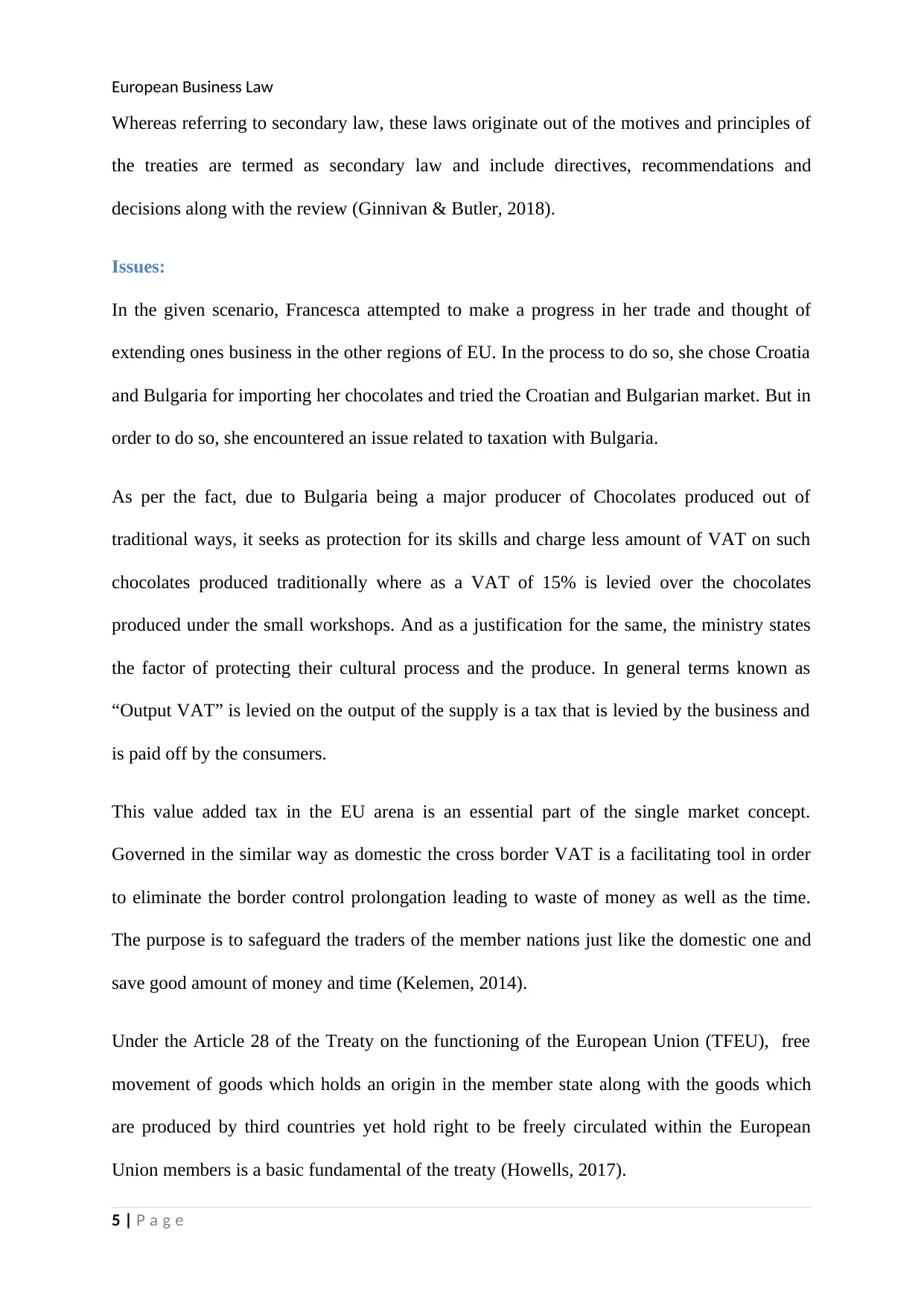
European Business Law
Whereas referring to secondary law, these laws originate out of the motives and principles of
the treaties are termed as secondary law and include directives, recommendations and
decisions along with the review (Ginnivan & Butler, 2018).
Issues:
In the given scenario, Francesca attempted to make a progress in her trade and thought of
extending ones business in the other regions of EU. In the process to do so, she chose Croatia
and Bulgaria for importing her chocolates and tried the Croatian and Bulgarian market. But in
order to do so, she encountered an issue related to taxation with Bulgaria.
As per the fact, due to Bulgaria being a major producer of Chocolates produced out of
traditional ways, it seeks as protection for its skills and charge less amount of VAT on such
chocolates produced traditionally where as a VAT of 15% is levied over the chocolates
produced under the small workshops. And as a justification for the same, the ministry states
the factor of protecting their cultural process and the produce. In general terms known as
“Output VAT” is levied on the output of the supply is a tax that is levied by the business and
is paid off by the consumers.
This value added tax in the EU arena is an essential part of the single market concept.
Governed in the similar way as domestic the cross border VAT is a facilitating tool in order
to eliminate the border control prolongation leading to waste of money as well as the time.
The purpose is to safeguard the traders of the member nations just like the domestic one and
save good amount of money and time (Kelemen, 2014).
Under the Article 28 of the Treaty on the functioning of the European Union (TFEU), free
movement of goods which holds an origin in the member state along with the goods which
are produced by third countries yet hold right to be freely circulated within the European
Union members is a basic fundamental of the treaty (Howells, 2017).
5 | P a g e
Whereas referring to secondary law, these laws originate out of the motives and principles of
the treaties are termed as secondary law and include directives, recommendations and
decisions along with the review (Ginnivan & Butler, 2018).
Issues:
In the given scenario, Francesca attempted to make a progress in her trade and thought of
extending ones business in the other regions of EU. In the process to do so, she chose Croatia
and Bulgaria for importing her chocolates and tried the Croatian and Bulgarian market. But in
order to do so, she encountered an issue related to taxation with Bulgaria.
As per the fact, due to Bulgaria being a major producer of Chocolates produced out of
traditional ways, it seeks as protection for its skills and charge less amount of VAT on such
chocolates produced traditionally where as a VAT of 15% is levied over the chocolates
produced under the small workshops. And as a justification for the same, the ministry states
the factor of protecting their cultural process and the produce. In general terms known as
“Output VAT” is levied on the output of the supply is a tax that is levied by the business and
is paid off by the consumers.
This value added tax in the EU arena is an essential part of the single market concept.
Governed in the similar way as domestic the cross border VAT is a facilitating tool in order
to eliminate the border control prolongation leading to waste of money as well as the time.
The purpose is to safeguard the traders of the member nations just like the domestic one and
save good amount of money and time (Kelemen, 2014).
Under the Article 28 of the Treaty on the functioning of the European Union (TFEU), free
movement of goods which holds an origin in the member state along with the goods which
are produced by third countries yet hold right to be freely circulated within the European
Union members is a basic fundamental of the treaty (Howells, 2017).
5 | P a g e
⊘ This is a preview!⊘
Do you want full access?
Subscribe today to unlock all pages.

Trusted by 1+ million students worldwide
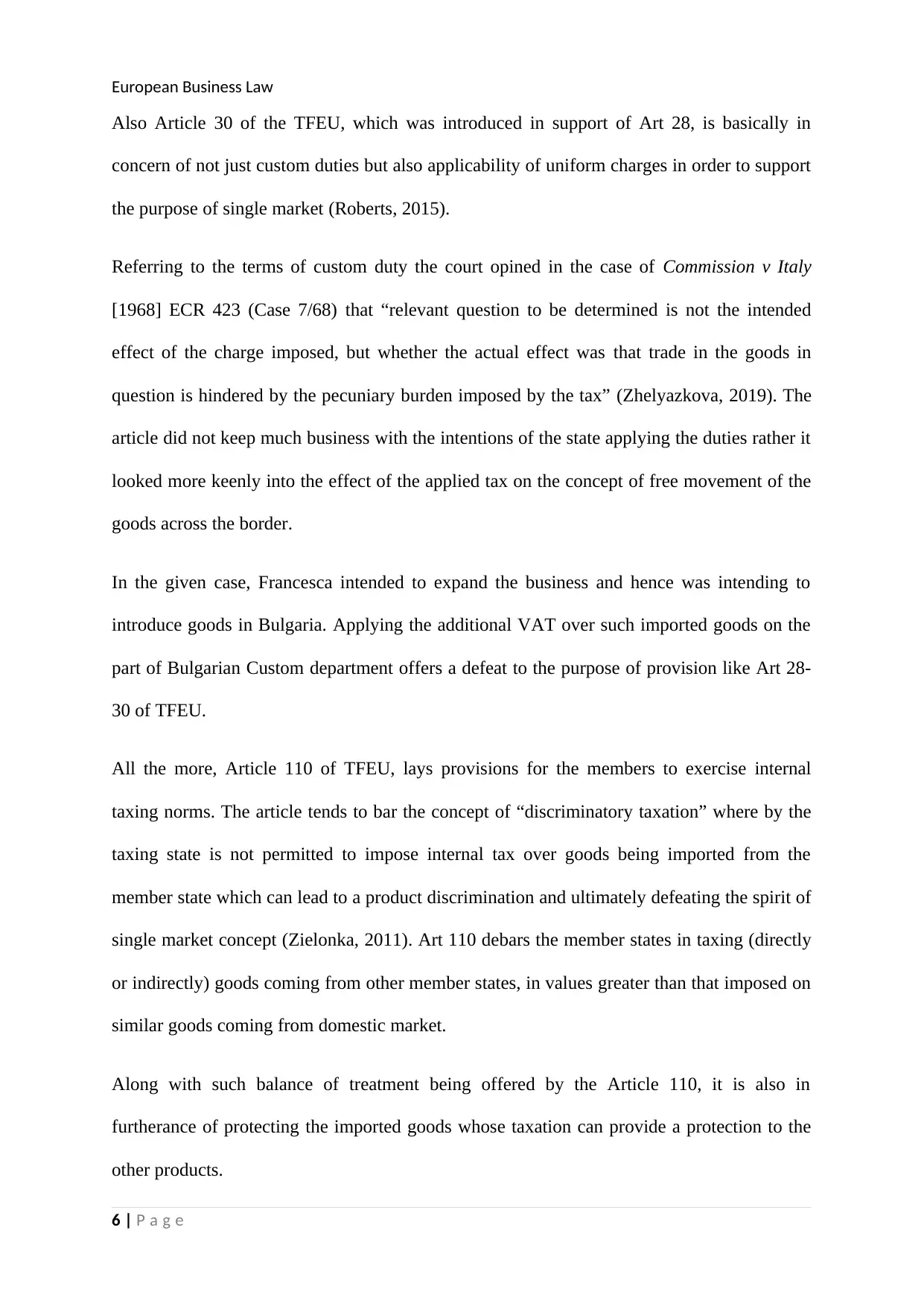
European Business Law
Also Article 30 of the TFEU, which was introduced in support of Art 28, is basically in
concern of not just custom duties but also applicability of uniform charges in order to support
the purpose of single market (Roberts, 2015).
Referring to the terms of custom duty the court opined in the case of Commission v Italy
[1968] ECR 423 (Case 7/68) that “relevant question to be determined is not the intended
effect of the charge imposed, but whether the actual effect was that trade in the goods in
question is hindered by the pecuniary burden imposed by the tax” (Zhelyazkova, 2019). The
article did not keep much business with the intentions of the state applying the duties rather it
looked more keenly into the effect of the applied tax on the concept of free movement of the
goods across the border.
In the given case, Francesca intended to expand the business and hence was intending to
introduce goods in Bulgaria. Applying the additional VAT over such imported goods on the
part of Bulgarian Custom department offers a defeat to the purpose of provision like Art 28-
30 of TFEU.
All the more, Article 110 of TFEU, lays provisions for the members to exercise internal
taxing norms. The article tends to bar the concept of “discriminatory taxation” where by the
taxing state is not permitted to impose internal tax over goods being imported from the
member state which can lead to a product discrimination and ultimately defeating the spirit of
single market concept (Zielonka, 2011). Art 110 debars the member states in taxing (directly
or indirectly) goods coming from other member states, in values greater than that imposed on
similar goods coming from domestic market.
Along with such balance of treatment being offered by the Article 110, it is also in
furtherance of protecting the imported goods whose taxation can provide a protection to the
other products.
6 | P a g e
Also Article 30 of the TFEU, which was introduced in support of Art 28, is basically in
concern of not just custom duties but also applicability of uniform charges in order to support
the purpose of single market (Roberts, 2015).
Referring to the terms of custom duty the court opined in the case of Commission v Italy
[1968] ECR 423 (Case 7/68) that “relevant question to be determined is not the intended
effect of the charge imposed, but whether the actual effect was that trade in the goods in
question is hindered by the pecuniary burden imposed by the tax” (Zhelyazkova, 2019). The
article did not keep much business with the intentions of the state applying the duties rather it
looked more keenly into the effect of the applied tax on the concept of free movement of the
goods across the border.
In the given case, Francesca intended to expand the business and hence was intending to
introduce goods in Bulgaria. Applying the additional VAT over such imported goods on the
part of Bulgarian Custom department offers a defeat to the purpose of provision like Art 28-
30 of TFEU.
All the more, Article 110 of TFEU, lays provisions for the members to exercise internal
taxing norms. The article tends to bar the concept of “discriminatory taxation” where by the
taxing state is not permitted to impose internal tax over goods being imported from the
member state which can lead to a product discrimination and ultimately defeating the spirit of
single market concept (Zielonka, 2011). Art 110 debars the member states in taxing (directly
or indirectly) goods coming from other member states, in values greater than that imposed on
similar goods coming from domestic market.
Along with such balance of treatment being offered by the Article 110, it is also in
furtherance of protecting the imported goods whose taxation can provide a protection to the
other products.
6 | P a g e
Paraphrase This Document
Need a fresh take? Get an instant paraphrase of this document with our AI Paraphraser
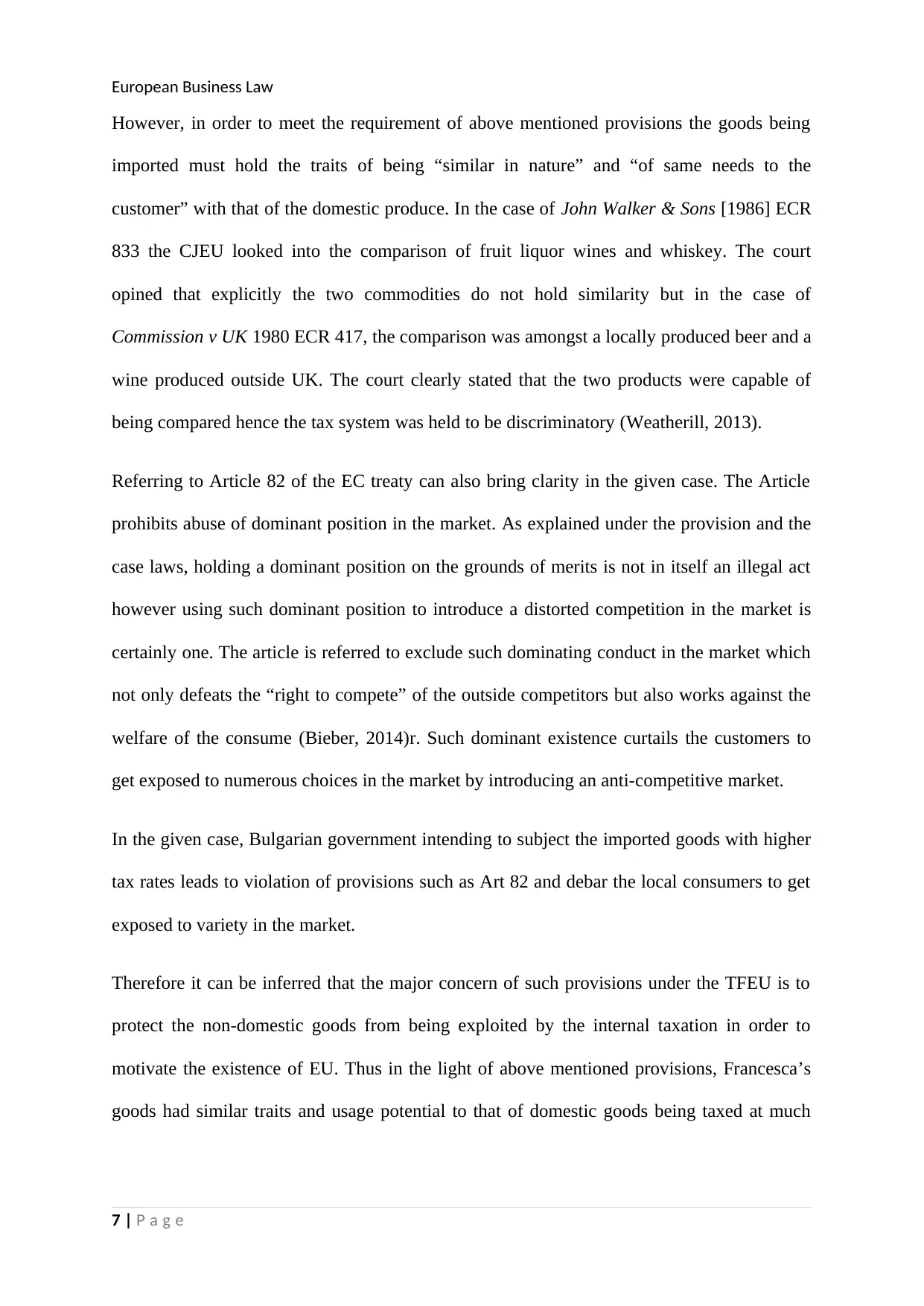
European Business Law
However, in order to meet the requirement of above mentioned provisions the goods being
imported must hold the traits of being “similar in nature” and “of same needs to the
customer” with that of the domestic produce. In the case of John Walker & Sons [1986] ECR
833 the CJEU looked into the comparison of fruit liquor wines and whiskey. The court
opined that explicitly the two commodities do not hold similarity but in the case of
Commission v UK 1980 ECR 417, the comparison was amongst a locally produced beer and a
wine produced outside UK. The court clearly stated that the two products were capable of
being compared hence the tax system was held to be discriminatory (Weatherill, 2013).
Referring to Article 82 of the EC treaty can also bring clarity in the given case. The Article
prohibits abuse of dominant position in the market. As explained under the provision and the
case laws, holding a dominant position on the grounds of merits is not in itself an illegal act
however using such dominant position to introduce a distorted competition in the market is
certainly one. The article is referred to exclude such dominating conduct in the market which
not only defeats the “right to compete” of the outside competitors but also works against the
welfare of the consume (Bieber, 2014)r. Such dominant existence curtails the customers to
get exposed to numerous choices in the market by introducing an anti-competitive market.
In the given case, Bulgarian government intending to subject the imported goods with higher
tax rates leads to violation of provisions such as Art 82 and debar the local consumers to get
exposed to variety in the market.
Therefore it can be inferred that the major concern of such provisions under the TFEU is to
protect the non-domestic goods from being exploited by the internal taxation in order to
motivate the existence of EU. Thus in the light of above mentioned provisions, Francesca’s
goods had similar traits and usage potential to that of domestic goods being taxed at much
7 | P a g e
However, in order to meet the requirement of above mentioned provisions the goods being
imported must hold the traits of being “similar in nature” and “of same needs to the
customer” with that of the domestic produce. In the case of John Walker & Sons [1986] ECR
833 the CJEU looked into the comparison of fruit liquor wines and whiskey. The court
opined that explicitly the two commodities do not hold similarity but in the case of
Commission v UK 1980 ECR 417, the comparison was amongst a locally produced beer and a
wine produced outside UK. The court clearly stated that the two products were capable of
being compared hence the tax system was held to be discriminatory (Weatherill, 2013).
Referring to Article 82 of the EC treaty can also bring clarity in the given case. The Article
prohibits abuse of dominant position in the market. As explained under the provision and the
case laws, holding a dominant position on the grounds of merits is not in itself an illegal act
however using such dominant position to introduce a distorted competition in the market is
certainly one. The article is referred to exclude such dominating conduct in the market which
not only defeats the “right to compete” of the outside competitors but also works against the
welfare of the consume (Bieber, 2014)r. Such dominant existence curtails the customers to
get exposed to numerous choices in the market by introducing an anti-competitive market.
In the given case, Bulgarian government intending to subject the imported goods with higher
tax rates leads to violation of provisions such as Art 82 and debar the local consumers to get
exposed to variety in the market.
Therefore it can be inferred that the major concern of such provisions under the TFEU is to
protect the non-domestic goods from being exploited by the internal taxation in order to
motivate the existence of EU. Thus in the light of above mentioned provisions, Francesca’s
goods had similar traits and usage potential to that of domestic goods being taxed at much
7 | P a g e
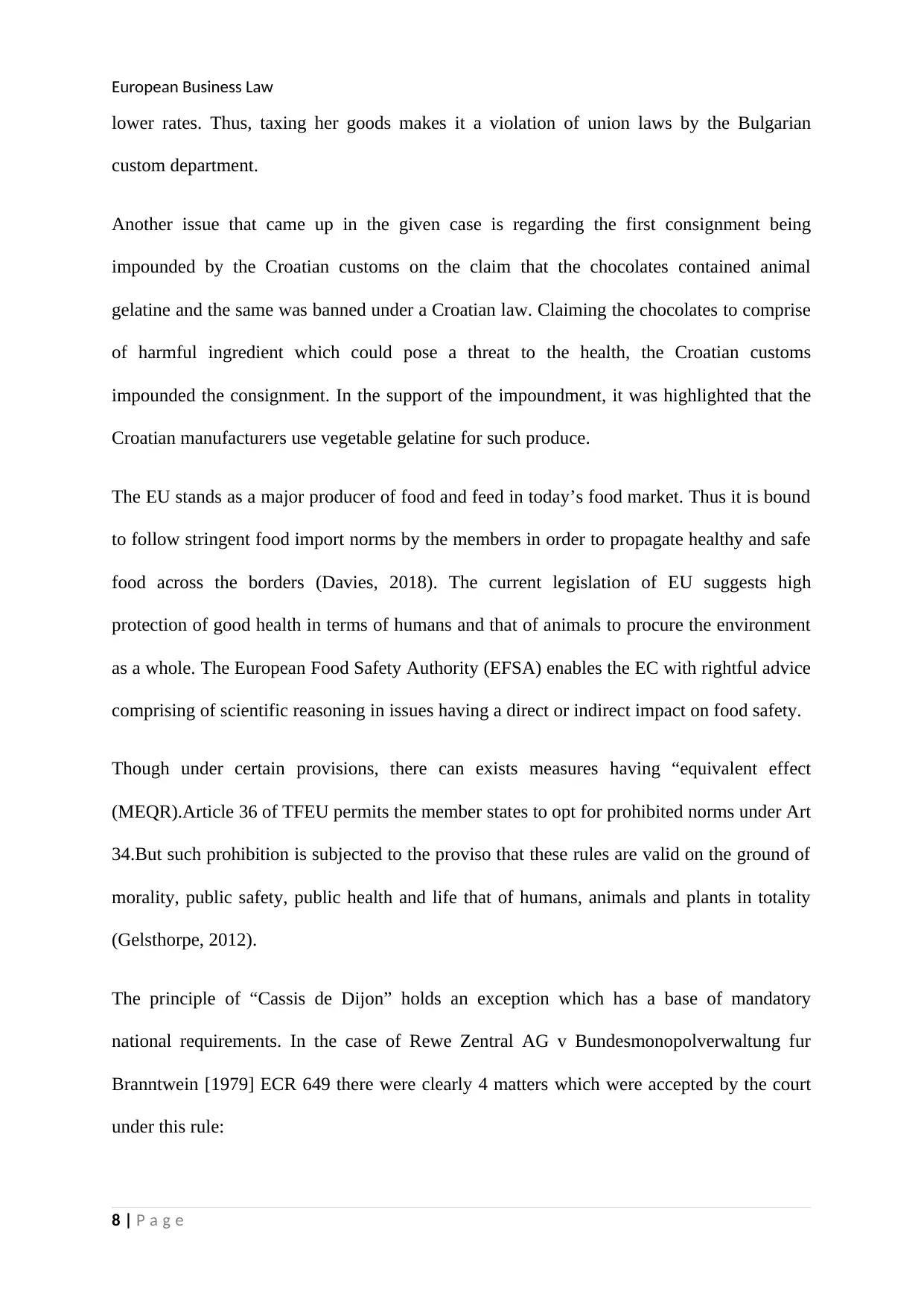
European Business Law
lower rates. Thus, taxing her goods makes it a violation of union laws by the Bulgarian
custom department.
Another issue that came up in the given case is regarding the first consignment being
impounded by the Croatian customs on the claim that the chocolates contained animal
gelatine and the same was banned under a Croatian law. Claiming the chocolates to comprise
of harmful ingredient which could pose a threat to the health, the Croatian customs
impounded the consignment. In the support of the impoundment, it was highlighted that the
Croatian manufacturers use vegetable gelatine for such produce.
The EU stands as a major producer of food and feed in today’s food market. Thus it is bound
to follow stringent food import norms by the members in order to propagate healthy and safe
food across the borders (Davies, 2018). The current legislation of EU suggests high
protection of good health in terms of humans and that of animals to procure the environment
as a whole. The European Food Safety Authority (EFSA) enables the EC with rightful advice
comprising of scientific reasoning in issues having a direct or indirect impact on food safety.
Though under certain provisions, there can exists measures having “equivalent effect
(MEQR).Article 36 of TFEU permits the member states to opt for prohibited norms under Art
34.But such prohibition is subjected to the proviso that these rules are valid on the ground of
morality, public safety, public health and life that of humans, animals and plants in totality
(Gelsthorpe, 2012).
The principle of “Cassis de Dijon” holds an exception which has a base of mandatory
national requirements. In the case of Rewe Zentral AG v Bundesmonopolverwaltung fur
Branntwein [1979] ECR 649 there were clearly 4 matters which were accepted by the court
under this rule:
8 | P a g e
lower rates. Thus, taxing her goods makes it a violation of union laws by the Bulgarian
custom department.
Another issue that came up in the given case is regarding the first consignment being
impounded by the Croatian customs on the claim that the chocolates contained animal
gelatine and the same was banned under a Croatian law. Claiming the chocolates to comprise
of harmful ingredient which could pose a threat to the health, the Croatian customs
impounded the consignment. In the support of the impoundment, it was highlighted that the
Croatian manufacturers use vegetable gelatine for such produce.
The EU stands as a major producer of food and feed in today’s food market. Thus it is bound
to follow stringent food import norms by the members in order to propagate healthy and safe
food across the borders (Davies, 2018). The current legislation of EU suggests high
protection of good health in terms of humans and that of animals to procure the environment
as a whole. The European Food Safety Authority (EFSA) enables the EC with rightful advice
comprising of scientific reasoning in issues having a direct or indirect impact on food safety.
Though under certain provisions, there can exists measures having “equivalent effect
(MEQR).Article 36 of TFEU permits the member states to opt for prohibited norms under Art
34.But such prohibition is subjected to the proviso that these rules are valid on the ground of
morality, public safety, public health and life that of humans, animals and plants in totality
(Gelsthorpe, 2012).
The principle of “Cassis de Dijon” holds an exception which has a base of mandatory
national requirements. In the case of Rewe Zentral AG v Bundesmonopolverwaltung fur
Branntwein [1979] ECR 649 there were clearly 4 matters which were accepted by the court
under this rule:
8 | P a g e
⊘ This is a preview!⊘
Do you want full access?
Subscribe today to unlock all pages.

Trusted by 1+ million students worldwide
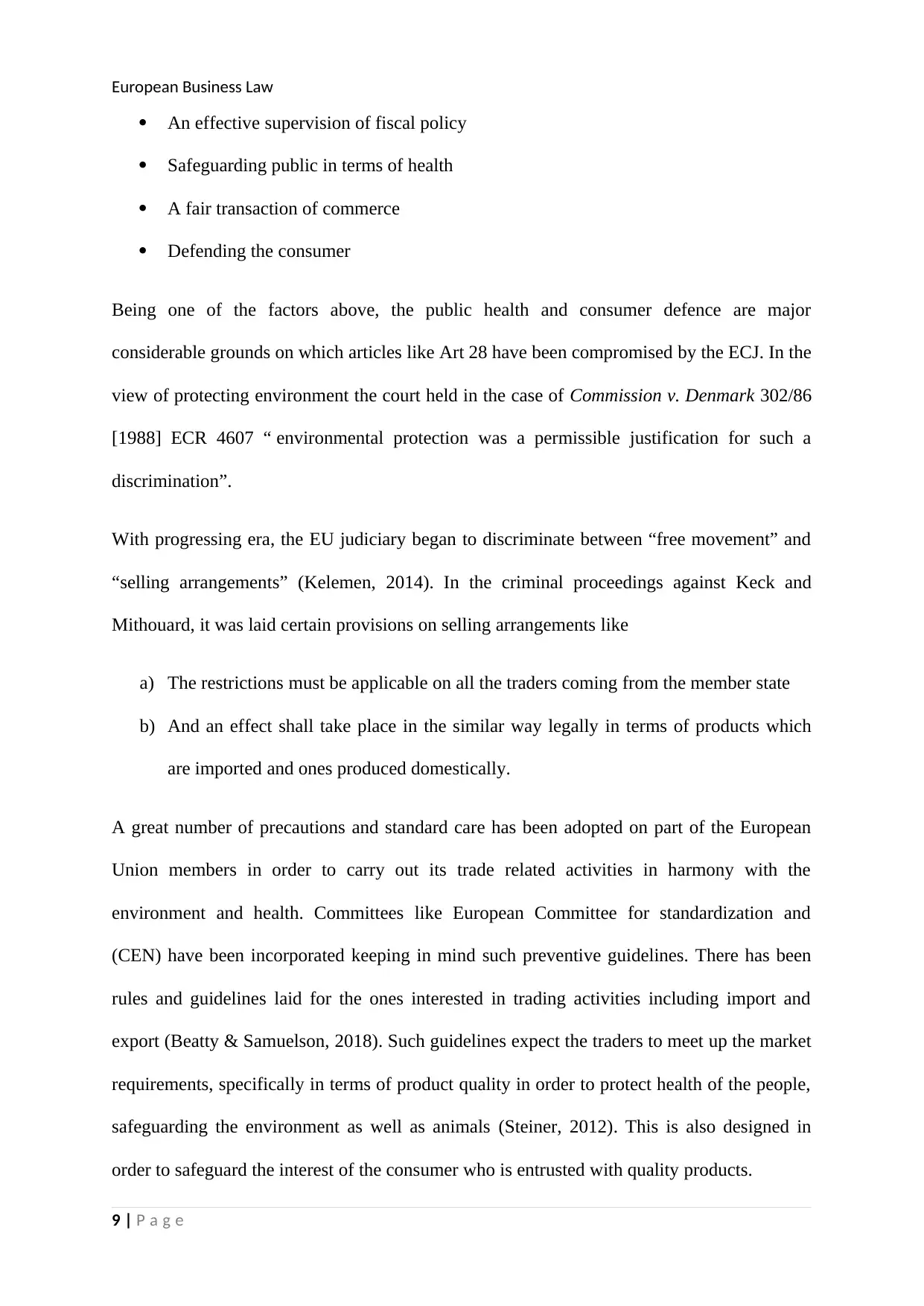
European Business Law
An effective supervision of fiscal policy
Safeguarding public in terms of health
A fair transaction of commerce
Defending the consumer
Being one of the factors above, the public health and consumer defence are major
considerable grounds on which articles like Art 28 have been compromised by the ECJ. In the
view of protecting environment the court held in the case of Commission v. Denmark 302/86
[1988] ECR 4607 “ environmental protection was a permissible justification for such a
discrimination”.
With progressing era, the EU judiciary began to discriminate between “free movement” and
“selling arrangements” (Kelemen, 2014). In the criminal proceedings against Keck and
Mithouard, it was laid certain provisions on selling arrangements like
a) The restrictions must be applicable on all the traders coming from the member state
b) And an effect shall take place in the similar way legally in terms of products which
are imported and ones produced domestically.
A great number of precautions and standard care has been adopted on part of the European
Union members in order to carry out its trade related activities in harmony with the
environment and health. Committees like European Committee for standardization and
(CEN) have been incorporated keeping in mind such preventive guidelines. There has been
rules and guidelines laid for the ones interested in trading activities including import and
export (Beatty & Samuelson, 2018). Such guidelines expect the traders to meet up the market
requirements, specifically in terms of product quality in order to protect health of the people,
safeguarding the environment as well as animals (Steiner, 2012). This is also designed in
order to safeguard the interest of the consumer who is entrusted with quality products.
9 | P a g e
An effective supervision of fiscal policy
Safeguarding public in terms of health
A fair transaction of commerce
Defending the consumer
Being one of the factors above, the public health and consumer defence are major
considerable grounds on which articles like Art 28 have been compromised by the ECJ. In the
view of protecting environment the court held in the case of Commission v. Denmark 302/86
[1988] ECR 4607 “ environmental protection was a permissible justification for such a
discrimination”.
With progressing era, the EU judiciary began to discriminate between “free movement” and
“selling arrangements” (Kelemen, 2014). In the criminal proceedings against Keck and
Mithouard, it was laid certain provisions on selling arrangements like
a) The restrictions must be applicable on all the traders coming from the member state
b) And an effect shall take place in the similar way legally in terms of products which
are imported and ones produced domestically.
A great number of precautions and standard care has been adopted on part of the European
Union members in order to carry out its trade related activities in harmony with the
environment and health. Committees like European Committee for standardization and
(CEN) have been incorporated keeping in mind such preventive guidelines. There has been
rules and guidelines laid for the ones interested in trading activities including import and
export (Beatty & Samuelson, 2018). Such guidelines expect the traders to meet up the market
requirements, specifically in terms of product quality in order to protect health of the people,
safeguarding the environment as well as animals (Steiner, 2012). This is also designed in
order to safeguard the interest of the consumer who is entrusted with quality products.
9 | P a g e
Paraphrase This Document
Need a fresh take? Get an instant paraphrase of this document with our AI Paraphraser
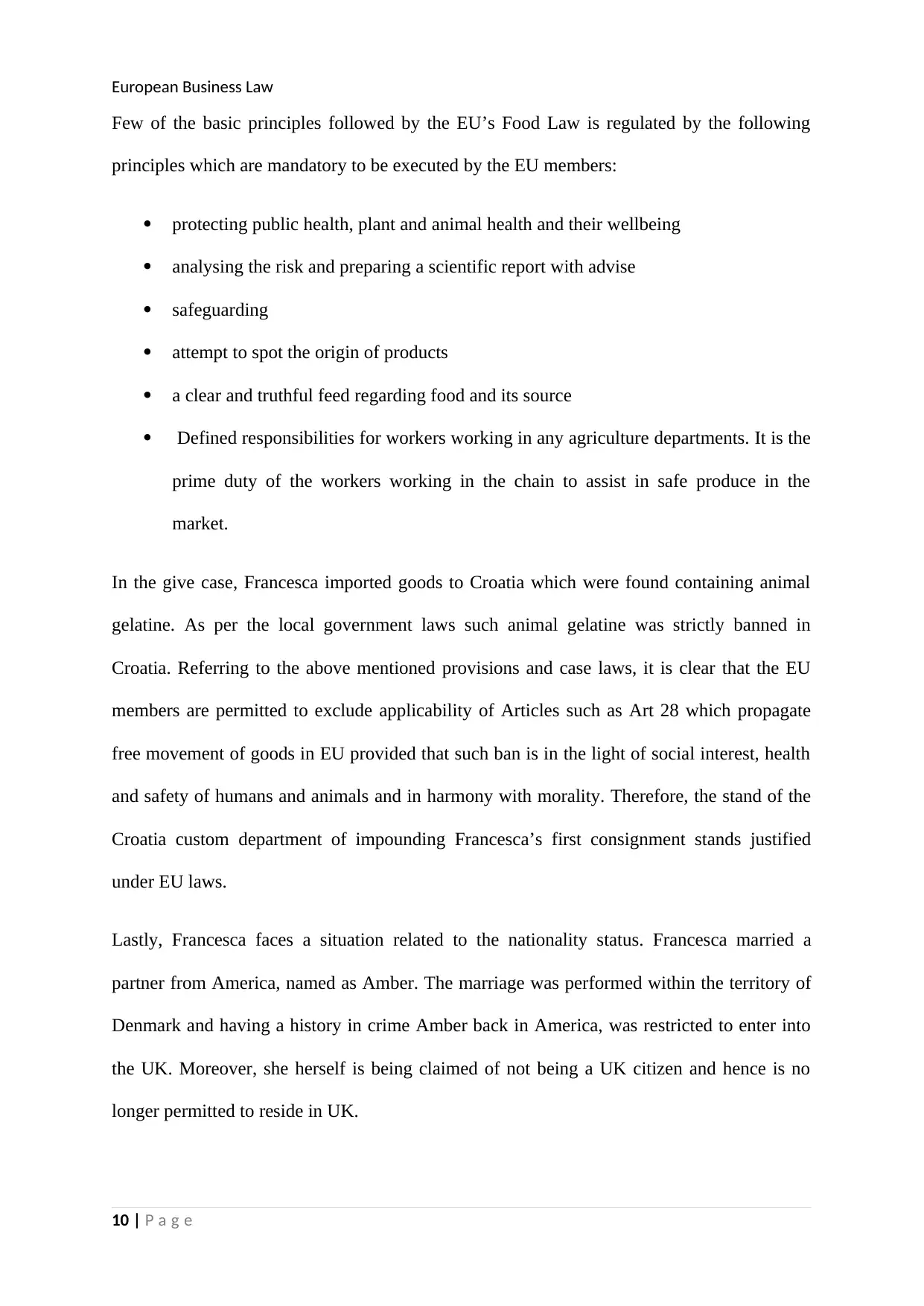
European Business Law
Few of the basic principles followed by the EU’s Food Law is regulated by the following
principles which are mandatory to be executed by the EU members:
protecting public health, plant and animal health and their wellbeing
analysing the risk and preparing a scientific report with advise
safeguarding
attempt to spot the origin of products
a clear and truthful feed regarding food and its source
Defined responsibilities for workers working in any agriculture departments. It is the
prime duty of the workers working in the chain to assist in safe produce in the
market.
In the give case, Francesca imported goods to Croatia which were found containing animal
gelatine. As per the local government laws such animal gelatine was strictly banned in
Croatia. Referring to the above mentioned provisions and case laws, it is clear that the EU
members are permitted to exclude applicability of Articles such as Art 28 which propagate
free movement of goods in EU provided that such ban is in the light of social interest, health
and safety of humans and animals and in harmony with morality. Therefore, the stand of the
Croatia custom department of impounding Francesca’s first consignment stands justified
under EU laws.
Lastly, Francesca faces a situation related to the nationality status. Francesca married a
partner from America, named as Amber. The marriage was performed within the territory of
Denmark and having a history in crime Amber back in America, was restricted to enter into
the UK. Moreover, she herself is being claimed of not being a UK citizen and hence is no
longer permitted to reside in UK.
10 | P a g e
Few of the basic principles followed by the EU’s Food Law is regulated by the following
principles which are mandatory to be executed by the EU members:
protecting public health, plant and animal health and their wellbeing
analysing the risk and preparing a scientific report with advise
safeguarding
attempt to spot the origin of products
a clear and truthful feed regarding food and its source
Defined responsibilities for workers working in any agriculture departments. It is the
prime duty of the workers working in the chain to assist in safe produce in the
market.
In the give case, Francesca imported goods to Croatia which were found containing animal
gelatine. As per the local government laws such animal gelatine was strictly banned in
Croatia. Referring to the above mentioned provisions and case laws, it is clear that the EU
members are permitted to exclude applicability of Articles such as Art 28 which propagate
free movement of goods in EU provided that such ban is in the light of social interest, health
and safety of humans and animals and in harmony with morality. Therefore, the stand of the
Croatia custom department of impounding Francesca’s first consignment stands justified
under EU laws.
Lastly, Francesca faces a situation related to the nationality status. Francesca married a
partner from America, named as Amber. The marriage was performed within the territory of
Denmark and having a history in crime Amber back in America, was restricted to enter into
the UK. Moreover, she herself is being claimed of not being a UK citizen and hence is no
longer permitted to reside in UK.
10 | P a g e
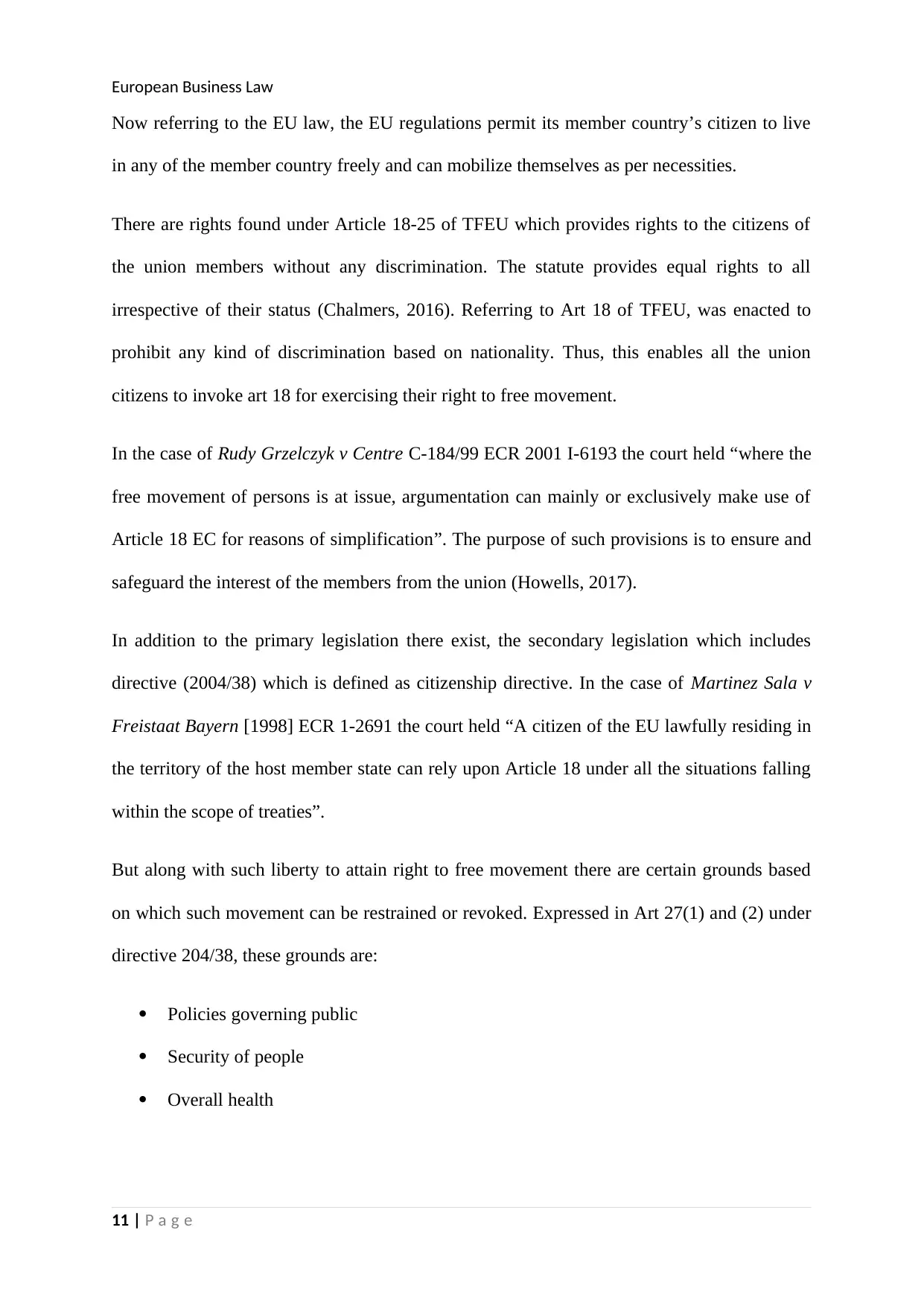
European Business Law
Now referring to the EU law, the EU regulations permit its member country’s citizen to live
in any of the member country freely and can mobilize themselves as per necessities.
There are rights found under Article 18-25 of TFEU which provides rights to the citizens of
the union members without any discrimination. The statute provides equal rights to all
irrespective of their status (Chalmers, 2016). Referring to Art 18 of TFEU, was enacted to
prohibit any kind of discrimination based on nationality. Thus, this enables all the union
citizens to invoke art 18 for exercising their right to free movement.
In the case of Rudy Grzelczyk v Centre C-184/99 ECR 2001 I-6193 the court held “where the
free movement of persons is at issue, argumentation can mainly or exclusively make use of
Article 18 EC for reasons of simplification”. The purpose of such provisions is to ensure and
safeguard the interest of the members from the union (Howells, 2017).
In addition to the primary legislation there exist, the secondary legislation which includes
directive (2004/38) which is defined as citizenship directive. In the case of Martinez Sala v
Freistaat Bayern [1998] ECR 1-2691 the court held “A citizen of the EU lawfully residing in
the territory of the host member state can rely upon Article 18 under all the situations falling
within the scope of treaties”.
But along with such liberty to attain right to free movement there are certain grounds based
on which such movement can be restrained or revoked. Expressed in Art 27(1) and (2) under
directive 204/38, these grounds are:
Policies governing public
Security of people
Overall health
11 | P a g e
Now referring to the EU law, the EU regulations permit its member country’s citizen to live
in any of the member country freely and can mobilize themselves as per necessities.
There are rights found under Article 18-25 of TFEU which provides rights to the citizens of
the union members without any discrimination. The statute provides equal rights to all
irrespective of their status (Chalmers, 2016). Referring to Art 18 of TFEU, was enacted to
prohibit any kind of discrimination based on nationality. Thus, this enables all the union
citizens to invoke art 18 for exercising their right to free movement.
In the case of Rudy Grzelczyk v Centre C-184/99 ECR 2001 I-6193 the court held “where the
free movement of persons is at issue, argumentation can mainly or exclusively make use of
Article 18 EC for reasons of simplification”. The purpose of such provisions is to ensure and
safeguard the interest of the members from the union (Howells, 2017).
In addition to the primary legislation there exist, the secondary legislation which includes
directive (2004/38) which is defined as citizenship directive. In the case of Martinez Sala v
Freistaat Bayern [1998] ECR 1-2691 the court held “A citizen of the EU lawfully residing in
the territory of the host member state can rely upon Article 18 under all the situations falling
within the scope of treaties”.
But along with such liberty to attain right to free movement there are certain grounds based
on which such movement can be restrained or revoked. Expressed in Art 27(1) and (2) under
directive 204/38, these grounds are:
Policies governing public
Security of people
Overall health
11 | P a g e
⊘ This is a preview!⊘
Do you want full access?
Subscribe today to unlock all pages.

Trusted by 1+ million students worldwide
1 out of 17
Related Documents
Your All-in-One AI-Powered Toolkit for Academic Success.
+13062052269
info@desklib.com
Available 24*7 on WhatsApp / Email
![[object Object]](/_next/static/media/star-bottom.7253800d.svg)
Unlock your academic potential
Copyright © 2020–2025 A2Z Services. All Rights Reserved. Developed and managed by ZUCOL.



